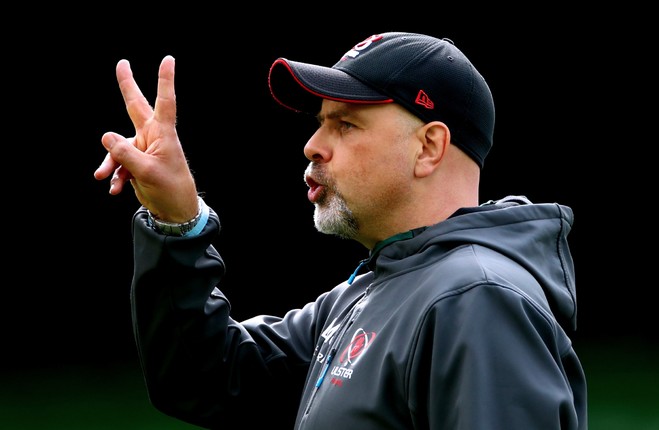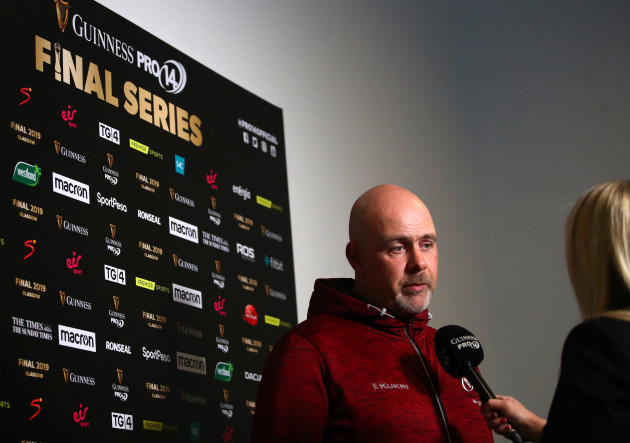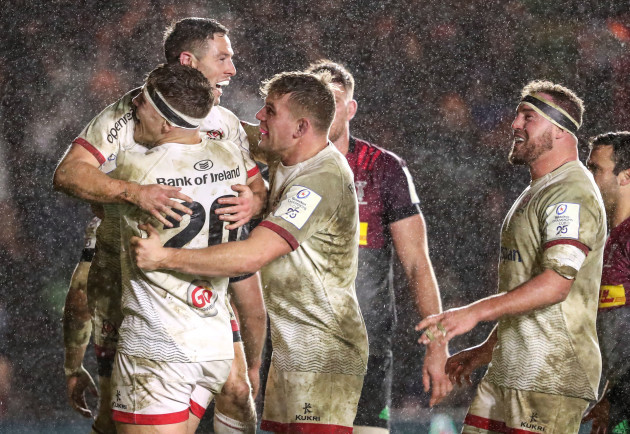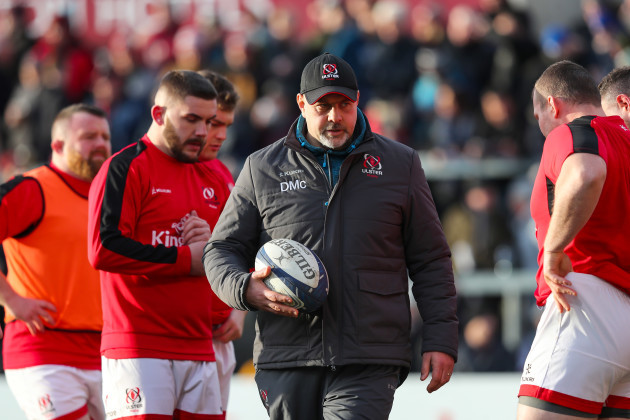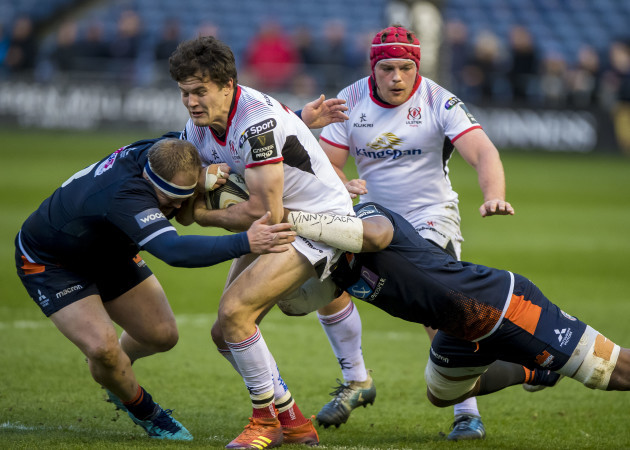HAVING JUST WATCHED his side be subjected to a 50-20 hammering by Glasgow Warriors in the semi-finals of the Guinness Pro14, Ulster head coach Dan McFarland was in surprisingly upbeat mood in May 2019.
He was one year into the job and, while the performance on that particular day had fallen a long way short of what he had hoped, McFarland was keen to continue the momentum he had generated over the course of his first year in charge at Kingspan Stadium.
Ulster were playing better rugby than they had ever done under the combined tutelage of Les Kiss and Jono Gibbes. Results were following too. Arguably, had it not been for Jacob Stockdale dropping the ball over the line, they would have seen off Leinster in the quarter-finals of the Heineken Champions Cup, and they had just competed in their first Pro14 semi-final since 2016.
“Going forward next year it will be a focus on new learning. It does not mean it becomes easier, it just means you can focus on other stuff,” McFarland had said standing in the media room at Scotstoun following what, at the time, seemed like a harrowing night in Glasgow.
“Some of the baseline stuff is in place and now I can focus on other things that will make us better.”
Fast forward a year (and four months due to the coronavirus) and Ulster find themselves in a strikingly similar position. They’re on the road again to Scotland for this year’s semi-final, only this time it’s to Edinburgh as opposed to the Warriors, and they still have a European quarter-final against Toulouse to prepare for.
Prior to lockdown, which nobody accounted for, the momentum had been continued and then some. Ulster were comfortably the second best side in Conference A of the Pro14 behind Leinster and had coasted through their Champions Cup pool along with Clermont. Both were signs of improvement.
Players such as Tom O’Toole, Billy Burns and Robert Baloucoune took strides in their development, earning call-ups to the Ireland squad. Jack McGrath, Sam Carter, Ian Madigan and Alby Mathewson have all been lured to Belfast as part of a strong recruitment drive. The coaching panel now boasts Roddy Grant and Dan Soper, both of whom are raved about by the players.
And yet, for all their improvements, the 2019/20 season could end with exactly the same outcome as one year prior: a Pro14 semi-final exit and elimination at the quarter-finals in Europe.
While progress from squad and player-development perspectives is hard to quantify as a whole, you can easily measure progression when it comes to results. If Ulster weren’t to go one step further in either competition, the argument would persist that they have, in fact, stood still over the past 16 months.
That’s not lost on McFarland, but the head coach rejected the argument out of hand when questioned about it in the lead-up to this weekend’s semi-final.
“It’s a difficult one to answer. Ultimately in sport improvement is measured in wins. That’s the only currency you have; that’s all you have that’s definitive, that you can mark. In terms of results, you’re at the whim of variables that you can’t control,” conceded the former Connacht prop.
“Theoretically, you could make unbelievable progress in a year it just so happens that everyone else has made more progress, or two other teams have. You might play remarkably well all year and then you’re hamstrung by injuries at a particular point of the season.
“Me personally, I want to win (on Saturday), massively. But I’ll be more looking at the performance and how we got to this point to measure whether we made improvement or not. Significant improvement would probably be measured as a win.”
Whether Ulster have improved as a team on the whole or not, one thing they do want to improve is that result at Scotstoun, which still does not sit easily among the 23 players who participated in that game.
On that occasion, the northern province were two tries down inside the opening 10 minutes and never recovered. By the time the half-time whistle sounded they were 21 points down, and after the restart it would get even more ugly. At full-time, they trudged off a well beaten side ready for summer having come into the knockout tie so full of belief this would be the year they returned to a domestic decider.
Therefore, it was somewhat telling that all three of McFarland, John Cooney and Matty Rea made reference to it in Monday’s press briefing, and Rea didn’t even feature in the game.
“Last year was disappointing. We were knocked over by the first wave and never got back to our feet, or not until it was too late,” recalls McFarland.
I thought Glasgow were excellent in that game, really good. I remember saying at the time that I didn’t know whether us at our best would have won that game at that point. I don’t know whether we would have done. The disappointment was that we didn’t play as well as we could have done. That really soured that experience for me. I know there’s a hunger in the squad this year that we want to give it our best shot this time.
“It’s a difficult task: there’s only ever been two wins in away semi-finals, both by Scarlets, so I know the difficulty of what’s in front of us, but we want to give a better shot than we did last year and put out a better performance.”
To bring the focus a bit more into the present, it’s not understating the situation to say that Ulster have to up their game substantially from what they put on the field against both Connacht and Leinster. While their performance against the latter was improved, they still were off the pace for the most part.
The problem is their time to iron out the creases in their game is already over. While their form pre-lockdown had done enough to guarantee themselves a place in the PRO14 semi-finals – albeit only because Glasgow failed to beat Edinburgh in their first meeting post-lockdown – their form since has not been good.
True, they are missing a cohort of talented players, Ireland lock Iain Henderson chief among them. Ireland duo Baloucoune and Will Addison are also in the medical room, as are Sean Reidy and Luke Marshall. And just from the Leinster game, Jacob Stockdale, Stuart McCloskey and Jordi Murphy are all doubts too. But even with all of them unavailable, the performances were strikingly lacklustre.
McFarland openly criticised his side’s mental capacity after the Connacht defeat, and then bemoaned their unforced error count following the Leinster loss. Edinburgh, with the lethal Duhan van der Merwe and Blair Kinghorn in their back three and the dynamic Bill Mata at No.8, will not be any less clinical if afforded opportunities.
Indeed, in many ways it’s an intriguing semi-final between two sides on very similar trajectories, both teams having been struggling for an identity a few years ago but now invigorated under new coaches – Ulster under McFarland and Edinburgh under Richard Cockerill.
As in many knockout games, it may end up being whoever turns up on the day rather than who is in form – which Ulster will certainly be hoping for – but either way it promises to be a captivating event, one which McFarland is keen to come out on the right side of.
You could legitimately say that they (Edinburgh) and Leinster have been the stand-out teams in our competition this year. Richard has built a squad there based on quality international players, I think they have 20 in their squad. You only have to look at the league table as it stands to see what a top-quality side they are. Leinster are the team to beat but Edinburgh aren’t far behind them.
“But the focus for us is on high standards of training and keeping a really good intensity at that training and focusing on the most important things we need to do to win the game.”
